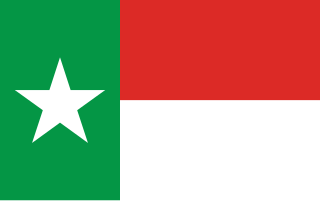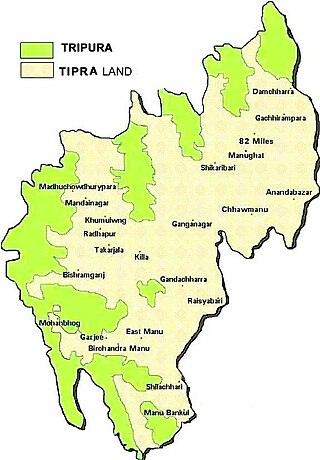Related Research Articles

Tripura is a state in northeastern India. The third-smallest state in the country, it covers 10,491 km2 (4,051 sq mi); and the seventh-least populous state with a population of 3.67 million. It is bordered by Assam and Mizoram to the east and by Bangladesh to the north, south and west. Tripura is divided into 8 districts and 23 sub-divisions, where Agartala is the capital and the largest city in the state. Tripura has 19 different tribal communities with a majority Bengali population. Bengali, English and Kokborok are the state's official languages.

The National Liberation Front of Tripura was a banned Christian Tripuri nationalist militant organisation based in Tripura, India. It had an estimated 1500 members in 2001.

Dhalai is an administrative district in the state of Tripura in India. The district headquarter is in Ambassa. As of 2011 it was the least populous district of Tripura, although it is the largest district in the state.

The Tripura Tribal Areas Autonomous District Council(TTAADC) is an autonomous district council administering the Tiprasa-dominated areas of the state of Tripura, India. Its council and assembly are situated in Khumulwng, a town 26 km away from Agartala, the state capital.

The Tripuri people (Kókborok: Tripuri dópha rok, are a Tibeto-Burman-speaking ethnic group of Bangladesh and Northeast Indian state of Tripura. They are the descendants of the inhabitants of the Twipra/Tripura Kingdom in North-East India and Bangladesh. The Tripuri people through the Manikya dynasty ruled the Kingdom of Tripura for over 600 years starting from 1400 A.D. until the kingdom joined the Indian Union on 15 October 1949. The Tipra Dynasty was established in 590 AD.
The Dances of Tripura refer to several forms of folk dance performed in the state of Tripura in northeastern India. These dances are performed by the Tripuri and Mog peoples, during annual regional celebrations, such as sowing and harvesting festivals.

Ujjayanta Palace is the state museum of the Indian state of Tripura and former royal palace of the princely state of Tripura. It was built by Maharaja Radha Kishore Manikya in 1901. It housed the State Legislative Assembly between 1973 and 2011. The palace primarily showcases the lifestyle, arts, culture, tradition and crafts of communities residing in northeast India, along with many stone sculptures of the Manikya dynasty.

The All Tripura Tiger Force (ATTF) was a Tripuri nationalist militant group active in India's Tripura State. It was founded on 11 July 1990, by a group of former Tripura National Volunteer members under the leadership of Ranjit Debbarma. The ATTF is considered a terrorist organisation by India. According to the South Asian Terrorism Portal, approximately 90% of the ATTF's administration are Hindu and the rest are Christians. The group was said to have been formed as the armed wing of the National Liberation Front of Tripura (NLFT) but split into its own organization. The group was headquartered in Tarabon in Bangladesh.
Sachindra Lal Singh was a leader of the Indian National Congress and the first Chief Minister of Tripura state in northeastern India from 1 July 1963 to 1 November 1971. In 1977, he became the leader of the newly formed Congress for Democracy party. He was elected to the sixth Lok Sabha from Tripura West constituency as a member of the congress for Democracy.Sachindralal Singh, the first Chief Minister of Tripura, was a highly popular leader of Tripura. He was fondly called “Sachin-da” and was highly admired for his simplicity and amiable nature.
Bidya Chandra Debbarma was a communist politician from the Indian state of Tripura. A prominent leader of the communist movement in Tripura, Debbarma spent a total of nine years in jail and 13 years as an underground activist. A six-time state assembly member and minister in the state government, Debbarma never lost any election he contested.

Tipraland is the name of a proposed state in India for the indigenous Tripuri people in the tribal areas of the Tripura state. They demand the Tripura Tribal Areas Autonomous District Council and some surrounding areas to be made into a separate state from Tripura. The proposed state covers 68% of the total geographical area of the Tripura and is home to over one-third of the total population of Tripura.
Education in Tripura, a state in Northeast India, is provided by both the public sector and the private sector. On 8 September 2013, the literacy rate of Tripura was declared to be 94.65%, which is the highest among all states of India.

Aghore Debbarma is an Indian politician and a former Agriculture minister of the Tripura state.
Scheduled Areas are areas in India with a preponderance of tribal population subject to a special governance mechanism wherein the central government plays a direct role in safeguarding cultural and economic interests of scheduled tribes in the area. The authority to create and administer Scheduled Areas stems from the Fifth and Sixth Schedules of the Constitution of India.
Tribal Research and Cultural Institute was established under Tribal Welfare Department in the year 1970 as per the decision of the Government of India. It is dedicated to conduct research on tribal issues and also evaluate the various programmes'/schemes' impact on the tribes residing in Tripura.
Rama Pada Jamatia is an Indian politician from Tripura. He formerly served as Minister of Tribal Welfare and Industry & Commerce in Government of Tripura under Manik Saha Ministry. He became the MLA from Bagma Assembly Constituency by defeating CPI(M) candidate Naresh Jamatia by a margin of 2,833 votes in 2018.

Sukla Charan Noatia is an Indian politician from Tripura. He is the Minister of Cooperation, Tribal Welfare, Welfare of Minorities in the Government of Tripura as part of the Second Saha Ministry. He became the MLA from Jolaibari Assembly constituency by defeating Debendra Tripura of Communist Party of India (Marxist) by a margin of 375 votes in 2023.
Bikash Debbarma is an Indian politician from Tripura. He is currently serving as Minister of Tribal Welfare, Handloom, Handicrafts and Sericulture and Statistics in Government of Tripura under Second Saha Ministry.
References
- ↑ "Tribal Welfare Department, Government of Tripura, India". twd.tripura.gov.in.
- ↑ "Departments | Official website of Tripura State Portal, India". tripura.gov.in. Government of Tripura . Retrieved 26 January 2025.